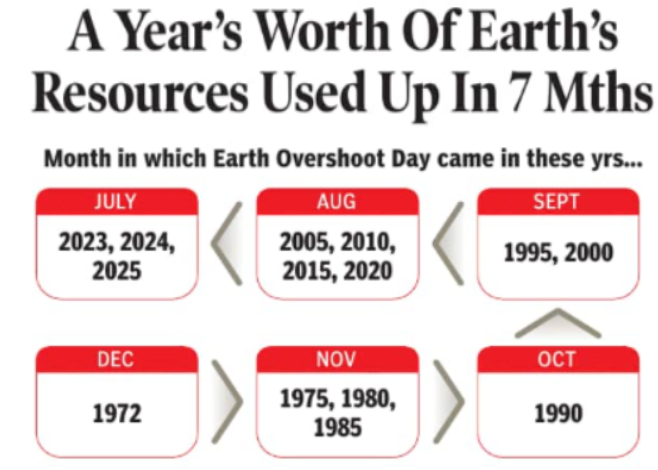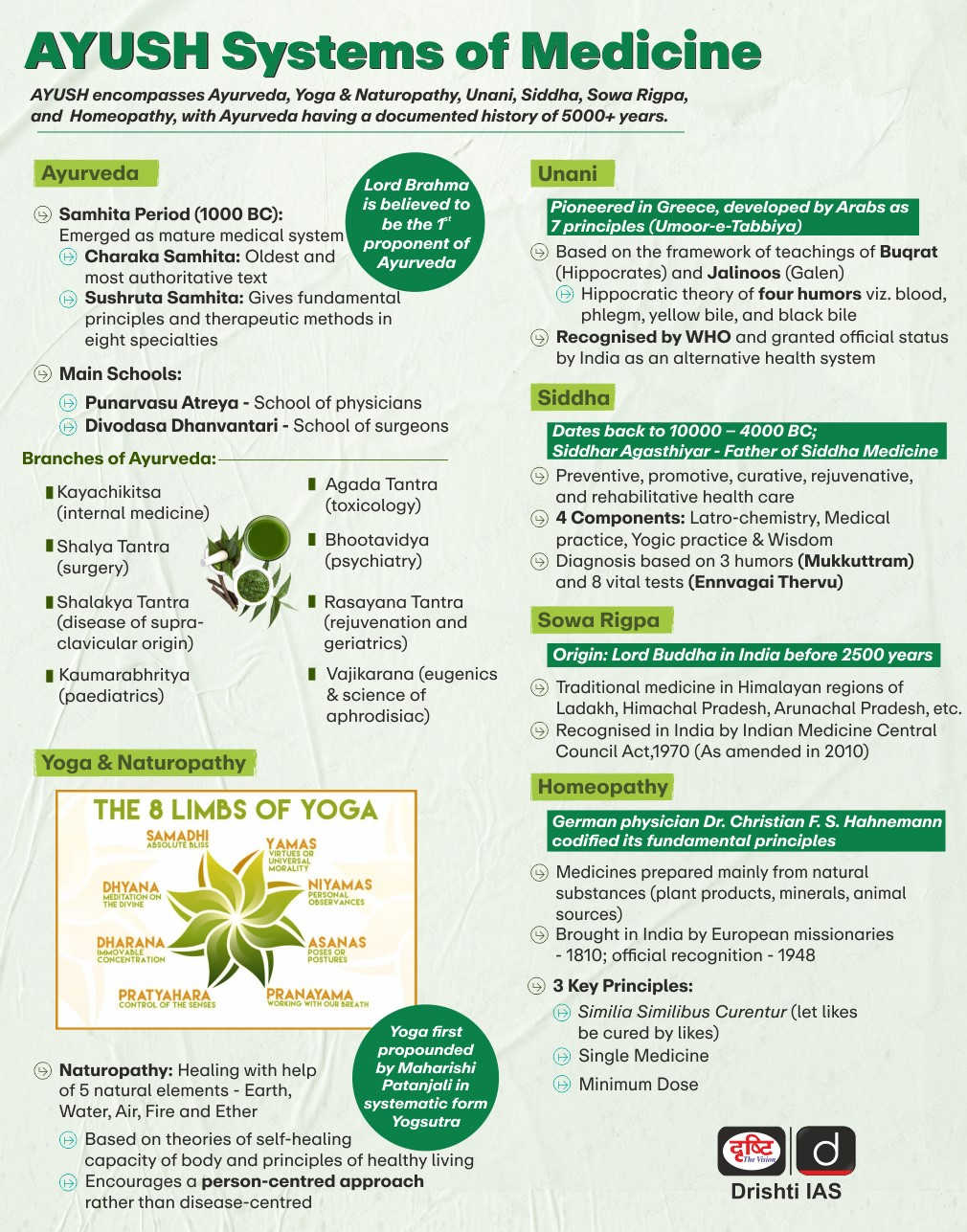National Current Affairs Switch to Hindi
Earth Overshoot Day 2025
Why in News?
Earth Overshoot Day occurred on 24th July this year(2025), marking the earliest date ever when humanity's demand for ecological resources surpasses what the Earth can regenerate in a year.
- This means humans have consumed an entire year's worth of resources in under seven months.
Key Points
- Definition: Earth Overshoot Day marks the date when humanity’s demand for ecological resources and services exceeds the Earth’s capacity to regenerate them in that year.
- Inception: The idea of Earth Overshoot Day was first proposed by Andrew Simms of the UK think tank New Economics Foundation.
- The New Economics Foundation partnered with Global Footprint Network in 2006 to launch the campaign. Since 2007, the World Wide Fund (WWF) has collaborated on the initiative.
- Calculation: Global Footprint Network hosts and calculates the event based on the National Footprint and Biocapacity Accounts, maintained by York University.
- The data is updated annually to reflect the most accurate and current global consumption patterns.
- Formula:
- Biocapacity vs. Ecological Footprint:
- Biocapacity: The amount of ecological resources Earth can regenerate in a given year (e.g., forests, grazing lands, croplands).
- Represents the Earth’s productive land and sea areas, including forests, grazing lands, cropland, and fishing grounds.
- Ecological Footprint: The total demand humanity places on these resources (including food, timber, space for urban infrastructure, and carbon dioxide absorption).
- Measures a population's demand for resources like food, fiber, timber, and space to absorb CO₂ emissions from fossil fuels.
- Biocapacity: The amount of ecological resources Earth can regenerate in a given year (e.g., forests, grazing lands, croplands).
- Global Impact:
- Ecological Deficit: When a region’s demand exceeds its ecological supply, it runs an ecological deficit. This deficit is addressed by importing resources, over-exploiting local ecosystems (like overfishing), and emitting CO₂ into the atmosphere.
- Global Overshoot: At a global scale, ecological deficit and overshoot are synonymous, as there’s no net import of resources to the planet.
National Current Affairs Switch to Hindi
Ayurveda Day 2025
Why in News?
Ayurveda Day, first observed in 2016, will now be celebrated on 23 September every year, replacing the earlier practice of celebrating it on Dhanvantari Jayanti (Dhanteras).
Key Points
- About: With the fixed date of 23 September, Ayurveda Day is poised to gain a permanent position in the global calendar, contributing to worldwide health, well-being, and ecological sustainability through the rich tradition of Ayurveda.
- Ayurveda spread globally through trade and cultural exchanges, influencing traditional medicine practices in Tibet, China, and beyond.
- Ayurveda Day has evolved into a global movement, highlighting Ayurveda's recognition as a traditional medicine system in 24 countries, with over 100 nations importing its products.
- Ayurveda Day 2025:
- The theme for 2025 is "Ayurveda for People & Planet," emphasizing global wellness and environmental sustainability through Ayurveda.
- The 2025 celebrations will focus on addressing global challenges like lifestyle disorders, climate-related diseases, and stress management, with Ayurveda promoted as a viable solution.
- The Ministry of Ayush will lead activities, including Awareness campaigns, Youth engagement programs, Wellness consultations, and International collaborations.
- Milestones of Ayurveda Day 2024: The 9th Ayurveda Day (2024) marked significant achievements in India's healthcare sector:
- Inauguration of Phase II of the All India Institute of Ayurveda (AIIA).
- Launch of four Centres of Excellence in Ayurveda.
- Introduction of “Desh Ka Prakriti Parikshan Abhiyan”
- Significance: The first all-India NSSO survey reaffirmed Ayurveda as the most used treatment system in both rural and urban India.
Initiatives Taken For Development of Ayurveda
National Current Affairs Switch to Hindi
Project Aarohan
Why in News?
National Highways Authority of India (NHAI), in collaboration with Vertis Infrastructure Trust, launched ‘Project Aarohan’ to support the educational aspirations of toll plaza employees' children, with the launch ceremony held at NHAI Headquarters in New Delhi.
Key Points
- About: The program aims to address financial barriers and promote equal access to quality education for students from economically weaker sections (EWS), first-generation learners, and marginalized communities, including Scheduled Castes (SC), Scheduled Tribes (ST), Other Backward Classes (OBC), and minority groups.
- Objective: The program combines financial assistance with structured mentorship, skill-building workshops, and career guidance to enhance the overall educational experience of the students.
- The initiative aims to equip students not only for higher education but also for future employment and entrepreneurship.
- Funding: The first phase of the project has been allocated a fund of ₹1 Crore for the financial year 2025-26.
- The project will support 500 students from Class 11 to their final year of graduation, offering an annual scholarship of 12,000 rupees for the financial year 2025-26.
- Fifty bright students aiming for postgraduate and higher studies will receive scholarships of 50,000 rupees each.
National Highway Authority of India (NHAI)
- The National Highway Authority of India (NHAI) was established by the NHAI Act, 1988, to oversee the development, maintenance, and management of national highways.
- NHAI's key responsibility is implementing the National Highways Development Project (NHDP), which covers 50,329 km of highways, and improving road infrastructure for smoother traffic flow.
- With a total length of 132,499 km, national highways carry about 40% of the total road traffic in India, despite making up only 2% of the road network.





 PCS Parikshan
PCS Parikshan




